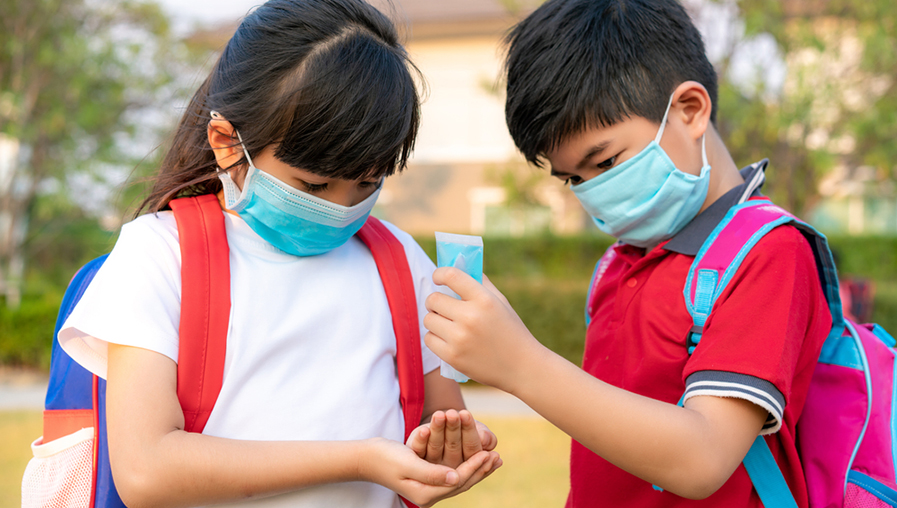Blog
Anything But Old School — Classes During COVID-19
Tips to Help Kids—And Parents—Adapt to Back to School in 2020

Heading back to school this fall has been anything but ordinary. And as everyone is settling into their versions of classes during COVID-19, there are plenty of adjustments to be made—for students and parents. As kids are attending school virtually, home schooling or doing a combination of regular attendance and distance-learning, students, parents, and teachers all have to navigate new realities full of rules, responsibilities, and stresses they’ve likely never considered before.
So how can we deal with the many challenges while making sure our kids continue to learn — and parents aren’t left feeling overwhelmed or spread too thin to accommodate both the kids’ new schedules, plus their own employment expectations? Even worse, how does one do it when everything is compounded with the frightening reality of a pandemic sweeping the country?
Here’s the nice thing to remember: there are no right answers. Job one is to make sure students feel safe—and parents to find routines that work for them—and their child. Comparison is the thief of joy—and success. Find ways that work for your student and shut out sources that may make you feel inadequate. There are many ways in which children learn, and as long as kids remain engaged and continue to progress and grow, you’re doing exactly what you should be doing. And go easy on yourself. With so many balls in the air, there are bound to be a few drops (and that’s okay). Developing new routines takes time, practice—and lot and lots of patience.
FOR KIDS
Have honest, reassuring conversations to make students feel safe. Kids, even little ones, know there is something significant going on. Talk frequently with them about why it is important to do the things you may be doing, like washing hands more often, cleaning more frequently or wearing a mask outside the house—and how everyone is doing their best to keep everyone safe and healthy.
For in-school learners, stress the importance of following the COVID 19 protocols in place. Support your school's policies and demonstrate responsible behavior for your children. Explain to them things like why they are wearing masks and the importance of keeping them on. Help them understand why staying socially distant can keep them safe. And remind them to listen to and trust their teachers—they are there to help them and keep them safe.
For virtual students, don’t sacrifice physical activity when spending more time at home. Exercise is always important, but especially for virtual learners, it can be easy to fall into a pattern of more inactivity than they’ve had before. Daily physical activity can help combat depression and helps to create a more normal and fun atmosphere that can involve the entire family.
Establish routines with morning rituals, dedicated learning space, etc. Even though school might be ten feet from their beds, make sure your kids are doing the same things they would during regular school years. Getting up, having breakfast, brushing teeth and getting ready for the day can help get them into school mode.
Encourage children to maintain social relationships. We may not be able to do it the same way, but help kids talk to their friends, however that might look. Set up times for the younger ones to communicate with each other online through computer applications or programs that feature face-to-face interaction. Let older kids have a bit of time to talk—or text—with their friends as well.
Healthy lunches and snacks. Nutrition is more important than ever; off course, it’s particularly important to help maintain a healthy immune system, especially in the midst the current health crisis. Good nutrition is also a preferred way to boost brain power, keep your body’s systems running smoothly, and, with a reduced level of physical activity, healthier choices are always a good way to provide balance for kids who aren’t as active.
FOR PARENTS
Practice self-care. Although it’s been said—many times, many ways—self-care is not selfish; it’s an absolute must. Family time is important, but adults need time for themselves, ideally choosing something screen-free. You’re balancing a lot—running a family—perhaps working as well, take time to step away from it all. Give yourself permission to read a book, try meditation, virtually connect with friends, take a walk, or find things that bring you a bit of health, peace and joy. Your emotional state influences your kids, so take care of YOU.
Repeat this mantra: The kids are going to be fine. Because they are. Things will be different for a while, but kids are adaptable and will learn, grow and develop (and think of the stories they’ll have for their one-day grandchildren). Adversities of past generations have taught us that there are certain things—and this certainly qualifies as one of them—that are simply out of our control. Do the very best you can and if you fail, guess what? You get to start over tomorrow. And though it may be hard to believer, try to remind yourself: this, too, shall pass. For real.
Don't micromanage the school day, especially for older kids. Keep abreast of what is going on, but remember you're not next to them all day at school. They're learning autonomy, along with math and science. Take a step back and let them learn how to manage their new realities—it will also help the teachers to reinforce and establish these new protocols and ways of learning.
Try meal prepping on the weekends, and involve the kids. This will help the daily schedule and take pressure off of you as you juggle school with your other responsibilities. Looking up healthy and fun recipes with the kids will get them more interested in what they’re eating—and by letting them cook with you, you may find teaching moments (measuring for a bit of math, baking shows off the magic of science) deliciously hidden in your meal prep time together.
Communicate proactively with teachers. It can be easy for kids to fall behind while learning remotely or splitting time between home and school, so check in either teachers regularly, in whatever way the school recommends. Some schools have ways in which parents monitor assignments daily—to see if students are meeting deadlines. Other teachers may prefer email correspondence. However it works for your school system, stay on top your students’ learning by maintaining a dialogue with their instructions in the way your school prefers.
FOR BOTH KIDS AND PARENTS
Remember your regular care visits. No, we’re not saying this because we’re a healthcare system. It really is important—especially now—to have your regular healthcare visits. Keep wellness visits, get any immunizations you student needs, so he or she stays on schedule. And get a flu shot for the entire family; this year, it’s more important than ever. Also, it’s imperative for those with chronic conditions, such as diabetes, to maintain care. And if you’re due for preventative screenings, such as mammograms or colonoscopies, keep, or make, those appointments. While it’s true that there is a lot going on right now, illnesses won’t wait, even during a pandemic.
Of course, mental health contributes to your total health and wellness, too—it’s actually more interlinked than many realize. If you—or your kids—are experiencing anxiety and depression that is unusually long-lasting or too overwhelming, contact your physician(s). There is help. Nobody has to struggle alone.
Together we're going to make it all work. As we all navigate this new normal, it’s true that there will be bumps in the road, probably some technical difficulties, and other things we can’t change. But in the end, the kids are going to learn, you as parents will do just great (we promise), and the terrific teachers are doing the best job they can. And if you get tangled up, tango on. If we’ve learned anything in 2020, the most important thing you can do if just keep going. As long as you provide your child with love and support, the learning will follow. Hang in there. You’ve got this.
Posted in: Health, Kids